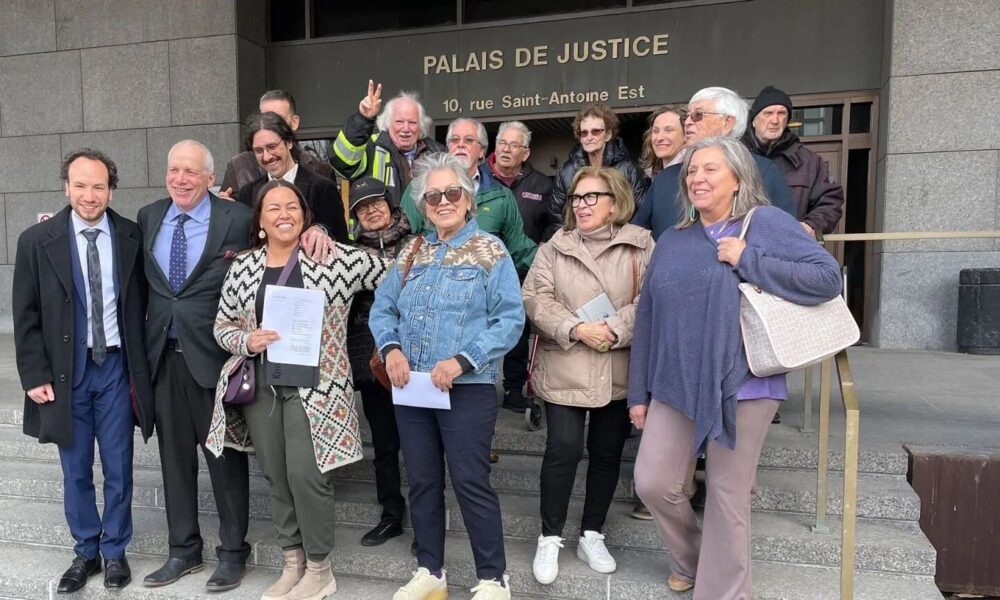Content Warning: Mentions of psychological and physical abuse
The Kanien’kehá:ka Kahnistensera (Mohawk Mothers) appeared in the Superior Court of Quebec on April 20 for a case management hearing about their recent settlement agreement with McGill. The hearing concluded a years-long legal battle over searching for potential unmarked Indigenous graves on McGill’s New Vic site.
Two weeks prior, on April 6, the Mothers reached a historic settlement agreement with the Société québécoise des infrastructures (SQI), Royal Victoria Hospital (RVH), City of Montreal, Attorney General of Canada, and McGill. The agreement mandates the immediate commencement of archival and testimonial investigations into and archeological work on the site of the New Vic project, with the support of a panel of archaeologists appointed by all parties.
The courtroom was sparsely filled, with the audience consisting of journalists, representatives from the defendants’ parties, and a small group of residents from Kahnawake. The atmosphere was melancholic and emotional, with passion radiating from Mohawk supporters and the Mothers.
The court proceedings began with the Mothers expressing that they would not proceed with the agreement unless it was homologated—meaning that it would be officially enforceable by law. The only defendant against formalizing the settlement was the SQI. After testimonies from all parties and representatives from the Office of the Independent Special Interlocutor, Justice Gregory Moore officially homologated the agreement. After the hearing, Mother Kwetiio told members of the press she was overjoyed by Moore’s ruling.
“For us, it’s a big step and it shows that Indigenous law works, using our own ways within this court,” Kwetiio said. “We were able to help people, not only our own people but also […] people that were at Allan Memorial. We’re here for everybody [….] This shows other people that […] this process is doable. It’s available. It’s attainable.”
The hearing concluded with a brief testimony from 82-year-old MK ULTRA survivor Lana Ponting, who had flown in from Winnipeg to support the Mothers. Ponting reflected on her time at the Allan Memorial Institute—a former psychiatric hospital located on the same plot of land as the New Vic project—where she received electroshock treatments and reported seeing digging when she was a patient.
“One night, I snuck out. I saw people with shovels,” Ponting said. “They were digging. I firmly believe there are bodies on the property of the Allan Memorial Institute.”
Julian Falconer, a representative from the Office of the Special Interlocutor, praised Moore for his historic rulings over the past few months. On Oct. 27, 2022, Moore granted the Mothers an injunction, halting all archeological work on the New Vic Site—a decision that marked the first time in Canadian history that Indigenous individuals have won without lawyers.
“What you’ve seen out of Justice Moore is nothing short of groundbreaking in this country,” Falconer said. “Not just his very important acceptance of Lana and her role, but his reasons as they relate to the granting of the injunction in October. No court has ordered such an injunction in Canadian history.”
Over the next few months, a panel of appointed archaeologists will map the land and determine the best methods to detect any potential unmarked graves on the site. Cultural monitors appointed by the Mothers must also be present throughout the investigative process. If no graves are found, the settlement agreement will permit the defendants to begin construction work on the site. Mother Kahentinetha shared that she’s relieved that Indigenous-led archaeological work has finally begun.
“They’re already out there on Mont-Royal, and they’re mapping it, and they’ll begin the work,” Kahentinetha said. “This is wonderful that we’ve finally got this going. It’s a big relief for us.”
In a written statement to The Tribune, McGill media relations officer Frédérique Mazerolle wrote that McGill is glad to have reached an agreement with the Mohawk Mothers, as it will foster collaboration and permit the university to resume work on the New Vic project.
“McGill is pleased that it has reached an agreement with the [Mohawk Mothers and SQI] to end injunction proceedings and allow McGill and the SQI to carry on with the redevelopment of the former Royal Victoria Hospital site,” Mazerolle wrote. “This agreement provides for an unprecedented collaboration […] which will shed light on allegations of the possible presence of unmarked graves on portions of the former Royal Victoria Hospital site.”
Falconer stressed that this case has set the precedent for Indigenous peoples seeking justice without a lawyer.
“The special interlocutor [Kimberly Murray] routinely speaks to the role of denialism in Canadian society,” Falconer said. “The stories are so horrific, we can’t accept them to be true. But Lana is living proof that they are true. The Mohawk Mothers are proof that […] you don’t need lawyers.”








